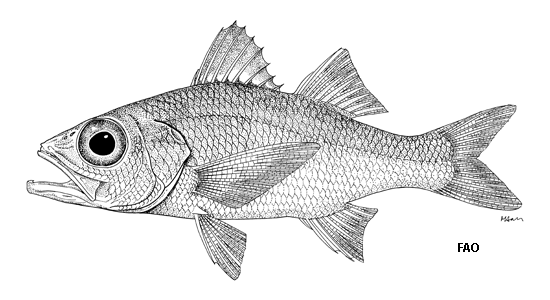| Malakichthyidae (Temperate ocean-basses) |
| 30 cm TL (male/unsexed) |
|
demersal; marine; depth range 0 - 650 m |
| Western Central Atlantic: off Cuba and Bahamaa and off Brazil. Probably has a wide range of distribution. |
|
Dorsal spines (total): 10-10; Dorsal soft rays (total): 10-10; Anal spines: 3-3; Anal soft rays: 7-7. This species is distinguished from its congeners by the following set of characters: lower jaw with a row of conical teeth posterior to a canine tooth near symphysis; absence of basioccipital fossa; proximal-middle radial of first anal-fin pterygiophore with no concavity on anterior surface; pectoral-fin rays 15 (rarely 16); first gill arch with 14-16 gill rakers on lower arm; lateral-line scales 43-45; body depth 32.1-36.8% SL (Ref. 123567). |
| Inhabits rocky bottoms to depths less than 100 m. |
|
Least Concern (LC); Date assessed: 29 January 2013 Ref. (130435)
|
| harmless |
Source and more info: www.fishbase.org. For personal, classroom, and other internal use only. Not for publication.

